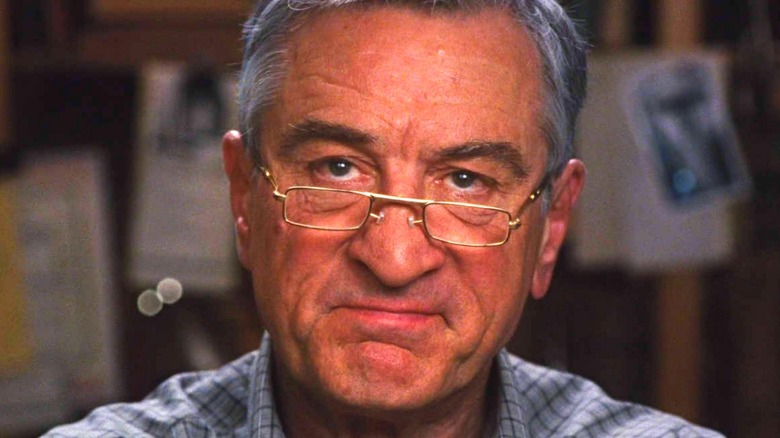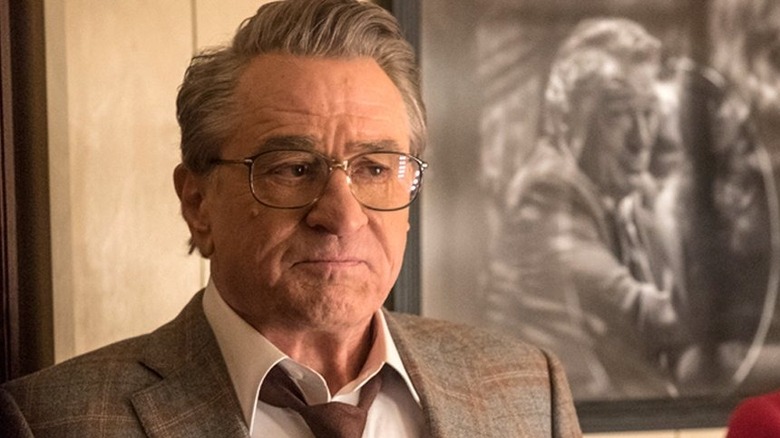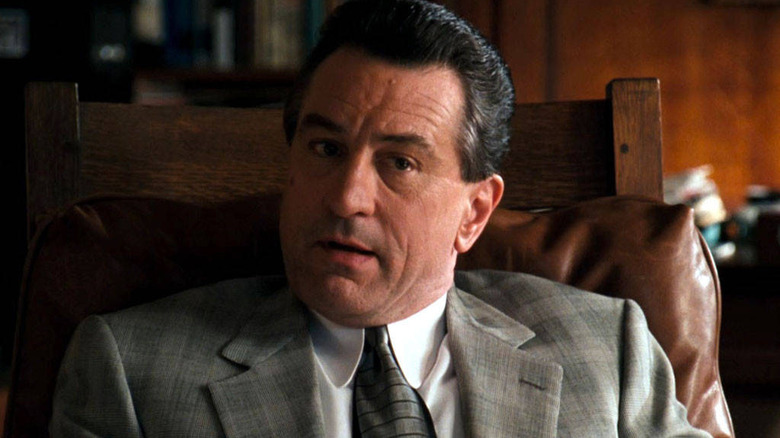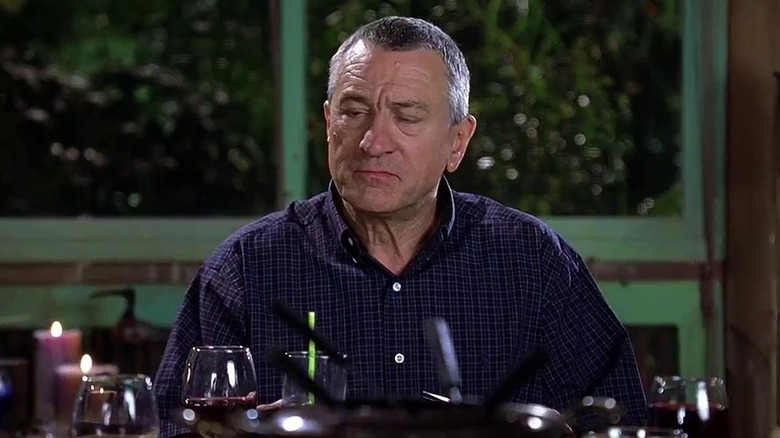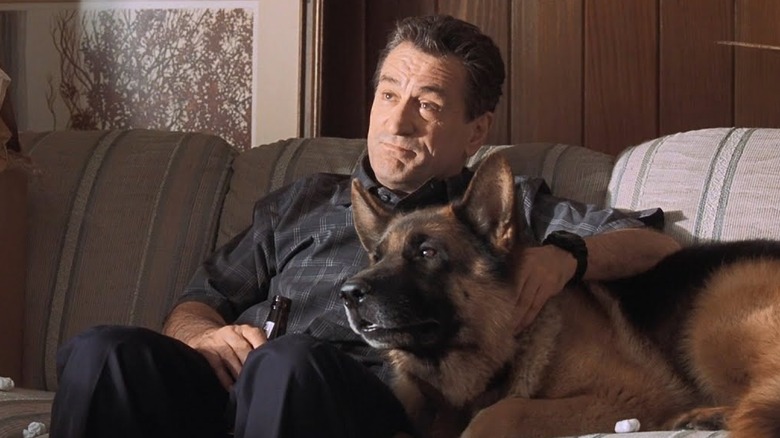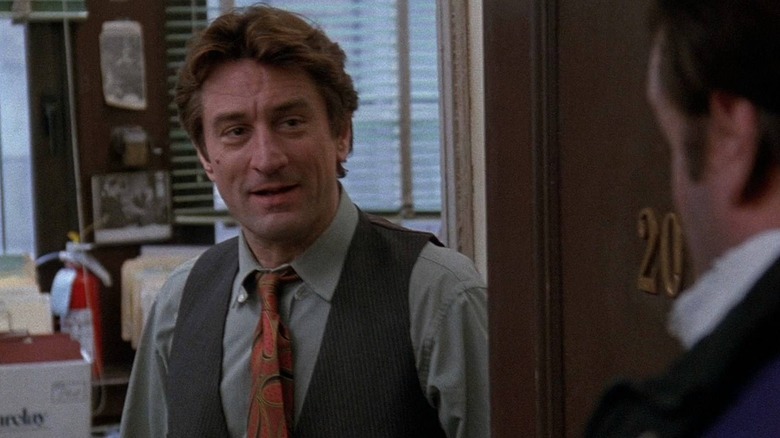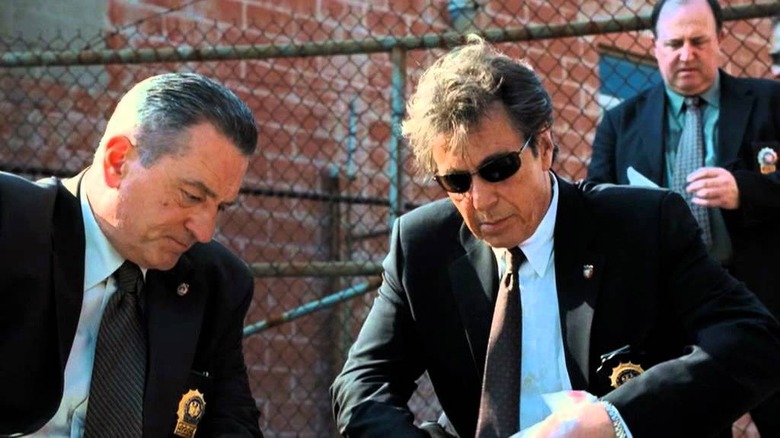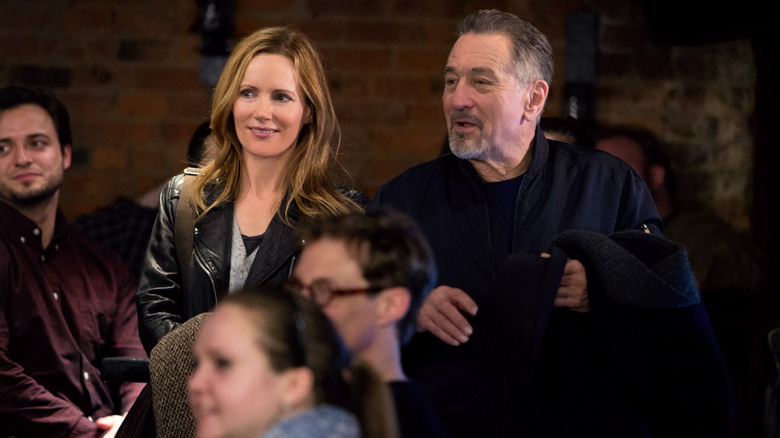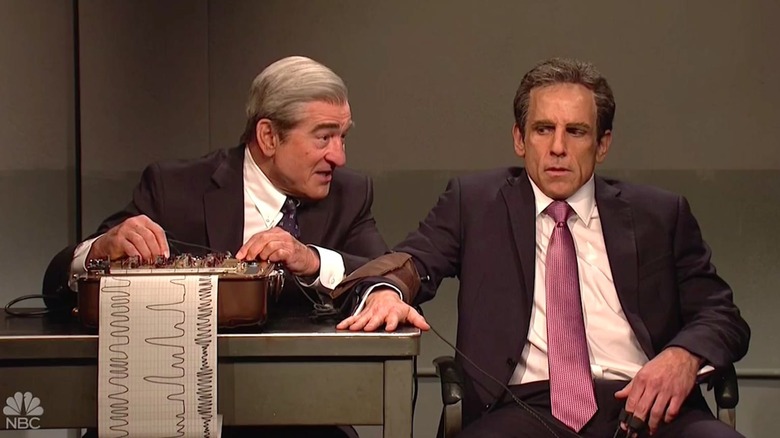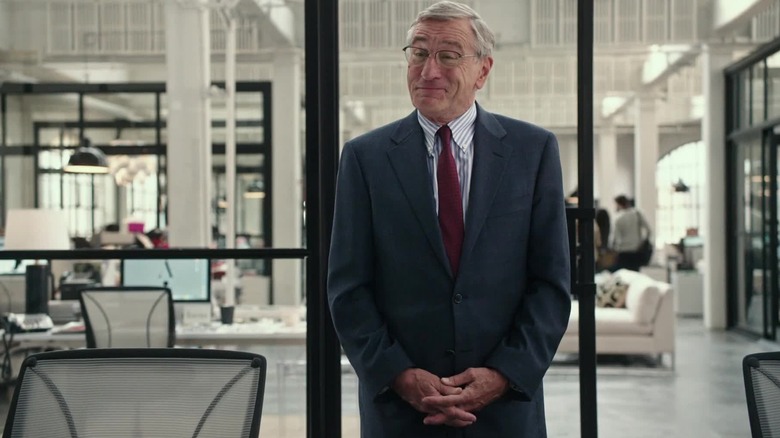10 Movie Roles Robert De Niro Should Have Turned Down
Everyone remembers their first Robert De Niro movie.
Mine was "Ronin," a really great but ultimately minor entry in the actor's canon. I knew enough about De Niro to know that he mattered, that his name should feel italicized when you say it, but even still I was blown away by the then 55-year old — blown away by his gravity, grace, and the ease with which he made simple moments visceral. Whether you're watching "Goodfellas" or "The Adventures of Rocky & Bullwinkle," I'd like to think that he blows everyone away on first exposure.
I say all this because Robert De Niro is an all-time legend who's appeared in films as disparate as, well, "Goodfellas" and "Rocky & Bullwinkle." And while I have no right to say which movies an actor, much less Robert De Niro, should or shouldn't sign on to, I am perpetually fascinated with how and why certain projects speak to specific performers.
By the time Robert De Niro was 40 years old, he had made "Raging Bull," "The Godfather Pt II," "The Deer Hunter," and "Taxi Driver." The world was (and still is) his oyster. How Robert De Niro wound up in three "Focker" films should be a point of fascination, not contention. It's time to get curious about De Niro's body of work and examine how it's shaped modern cinema. In that light, here are 10 roles that Robert De Niro should have turned down.
Joker
Let's start with a recent misstep.
Todd Phillips' "Joker" is a morose vanity project dressed in prestige film threads, a movie made less with purpose than the desire for it. Yes, it has an extraordinary lead performance and a masterful score, but it rarely knows what to do with them, choosing provocative needle drops over cohesive storytelling.
That said, "Joker" is a triumph of marketing. From its very first trailer, it appeared as though Phillips had brought Martin Scorsese to DC Comics, using everything from "Taxi Driver" to "The King of Comedy" as a reference point. That went double due to the casting of Robert De Niro, who starred in both those movies, as Murry Franklin, a talk show host who feels like his "King of Comedy" character, Rupert Pupkin, gone big time. De Niro's presence lends the project instant legitimacy.
That's why he shouldn't have done it. De Niro engenders trust in a movie that doesn't earn it. If De Niro had been given a character worth pitting against Joaquin Phoenix's Arthur Fleck, it would've at least felt like the actor was taking on a role worthy of his talents. Instead, Fleck is a sketch that De Niro fills with nuance. He would have been equally interesting in the hands of Brian Cox, Jack Nicholson, or Jon Hamm, just to name a few.
De Niro was asked to play Murray for De Niro's sake, in order to validify Todd Phillips' attempts to disguise allusion as cinema. His casting plays into the movie's worst impulses, and potentially robs us of a more interesting film. It's a project that he should have turned down.
Analyze This
"Joker" is not a film that I enjoy. "Analyze This" is. The Harold Ramis-directed comedy was another De Niro film I caught early in my existence and, while not every bit of it has aged well, the pairing of De Niro and all-time great funny man Billy Crystal is still smooth and combustible. "Analyze This" is a worthy addition to the film comedy canon. We are lucky that it exists.
However, as a thought experiment, consider this: If "Analyze This" doesn't happen, does De Niro appear in "Joker," Grudge Match," "Righteous Kill," or any of the other movies that deliberately comment on his legendary filmography? One shouldn't fault the actor for returning to familiar roles in old age, of course. He isn't the first great performer to do so, and he won't be the last.
The issue is that many of those films are among De Niro's weakest. None of them reach the heights of, say, Clint Eastwood's "Unforgiven," Jean Claude Van Damme's "JCVD," or "Creed," starring De Niro's "Grudge Match" co-star Sylvester Stallone. While "The Irishman" is a worthy companion to these films — if not their superior — it's just another entry in De Niro's long-standing collaboration with Martin Scorsese, and would likely have happened anyway.
Given that, think of "Analyze This" as De Niro's "One Week" by Barenaked Ladies. It's a moment that reframes his clout and popularity and makes them quirkier. It also encourages audiences to accept the diminishing returns that follow, and to ignore the productions that are more off-brand, like "Falling for the First Time." I'm glad that De Niro took the role, but it's hard to argue that it didn't lead to a dilution of his awe-inspiring catalog.
Meet the Fockers and Little Fockers
Sequels aren't meant to dull the power of their predecessors. According to the Oxford Dictionary, a sequel literally is "a work that continues the story" of an existing piece of media or that "develops the theme of an earlier one." The existence of a sequel means there's more to say, more to ponder, and more to sit with. Think "The Dark Knight." Think of Robert De Niro's own "The Godfather: Part II." At their best, second installments triumph over the original not because they're better films, but because they reveal their predecessors to be lob pasess while they, as films, are slam dunks.
That is not the case with "Meet the Fockers."
"Meet The Parents" is the platonic idea of a basic cable comedy, the sort of film that you can't help but watch front-to-back when you stumble on it while channel surfing. It makes you pleasurably cringe, and has no shortage of solid set pieces. It even comes with a solid hook for a follow-up: If it's a nightmare to meet your significant other's parents, what is it like for them to meet yours? What does it take to build an extended family?
These aren't questions that "Meet the Fockers" answers. Similarly, its follow-up, "Little Fockers," doesn't have much to say about parenting. Both of these films exist to go back to wells audiences were thirsty to drink from again, but offer air instead of water. De Niro should have turned both down.
Showtime
I want to be clear about something: I don't begrudge any creative on this list their choices. Not Robert De Niro, not the "Little Fockers" creative team, and not anyone involved with "Showtime," which certainly looked intriguing. Eddie Murphy and De Niro are capable of genuinely dangerous work, and both have turned in performances that feel like their brakes have been cut, but that are actually quite precise. Pairing them up in a buddy comedy could've reasonably yielded fiery games of comedic one-upmanship. There was no reason not to do it.
Except, as it turns out, "Showtime" threatened to derail the careers of almost all involved. Director Tom Dey ("Shanghai Noon") returned to obscurity after its release. Once it opened, Murphy and De Niro launched a string of lesser films, including "Daddy Day Care," "Analyze That," and the horror misfire "Hide and Seek."
But, on paper, there were reasons. The script was penned by Alfred Gough and Miles Millar, hot scribes who'd built their careers on subverting cliches. In its opening scenes, "Showtime" does appear to be a send up of buddy comedies. It's easy to imagine why De Niro and Murphy might want to make a project that skewers a genre they'd memorably contributed to (in "Midnight Run" and "48 Hrs," respectively). But "Showtime" is the kind of cautionary tale too often found in Hollywood, where good intentions often yield spoiled products. De Niro shouldn't have said yes to this one, but you can understand why he did.
Night and the City
For those who don't know, Fabian, an American hustler who works the mean streets of London in Jules Dassin's 1950 film "Night and the City" is one of cinema's greatest creations. Fabian is the noir-tinged American Dream, a gung-ho, burning bulb of possibility who would start massive fires just to keep the lights burning. It's one of Richard Widmark's best performances, and a character whose modus operandi still speaks to certain main characters in modern culture. Remaking "Night and the City," especially with De Niro, isn't an easily impeachable decision.
The reason why De Niro should have turned down Irwin Winkler's "Night and the City," then, is because Winkler dulls Dassin's story. Setting it in New York is the first major misstep. Although Dassin's version takes place in London primarily out of circumstance (the director was exiled from America for joining the Communist party when he was young), the international backdrop makes Fabian's machinations feel as American as they are personal. By contrast, the Harry Fabian of Winkler's "Night and the City" is a New Yorker surviving New York. We've seen his ilk before. We've even seen them played by Robert De Niro.
Additionally, Winkler's "Night and the City" defangs the original's devastating ending and grants Fabian his life. Winkler should be able to tell the story that he wants to, but the change keeps Fabian in line with other De Niro characters. A more faithful reimagining of "Night and the City" would have offered the actor a chance to do something different, and to add another lost soul to his already stellar repertoire. As it is, this one is forgettable.
The Killing Season
Method acting. Two words that are revered, misunderstood, and the root of some truly reprehensible acts. In a 1975 interview with Time (via The List), De Niro explains why he was so drawn to it: "To totally submerge into another character and experience life through him without having to risk the real-life consequences — well, it's a cheap way to do things you would never dare to do yourself."
It's hard to see the method in a movie like "The Killing Season," which feels as phoned in as John Travolta's haircut. The characters lack believable real-life consequences, and it's fascinating to wonder if saying yes to a faux-stakes project like "The Killing Season" (which, to be clear, is the kind of film most successful actors make some point) cleared a path for many others, including "Heist," "The Bag Man," and the controversy-baiting "Wash Me in the River." It's not that De Niro should have continued taking on projects with risky real-life consequences; it's that, maybe, he shouldn't have said yes to projects that didn't risk anything at all.
Righteous Kill
Speaking of risks, consider Michael Mann's "Heat."
Imagine someone walking into a major movie studio and saying that they're going to put two all-time cinema legends in an LA crime saga that doubles as an existentialist screed about living dangerously. And then, just for good measure, imagine he says that he'll only have these brilliant actors share the screen for one incendiary scene. It's a gesture that honors both performers' history of audacious choices.
It is also the opposite of Jon Avnet's "Righteous Kill," which gives the people what they want — De Niro and Pacino spend a lot more time together — but pales to "Heat" in almost every other way. The story of two morally dubious cops who track a serial killer who's probably a police officer, "Righteous Kill" is over-edited within an inch of its life and is barely concerned with cosmic questions. It's a meat and potatoes thriller made with rotten ingredients. But De Niro shouldn't have turned it down because it's bad. He should've turned it down because it weakens the impact of "Heat." That meeting between De Niro and Pacino could have stood as a singular one-off. Instead, it got a film-length coda that's little more than white noise.
To both De Niro and Pacino's credit, their next film together, Martin Scorsese's "The Irishman," is a worthy entry on both their filmographies. Still, signing onto "Righteous Kill" is a decision that all involved likely regret.
The Comedian
"The Comedian" feels like a tacit acknowledgement that Robert De Niro has been returning to some of his most well-known archetypes for the better part of two decades. He subverted his reputation by playing a mobster in "Analyze This." 2013's "Grudge Match" features the stars of the two biggest boxing movies of the '80s going head-to-head in their older age. De Niro has played a stand-up comedian to memorable effect as well, both in Martin Scorsese's "The King of Comedy" and in 2019's "Joker." And, let's be clear, going back to what works is a fine thing for an actor to do. Lesser ones have built entire careers out of it.
The issue with "The Comedian" isn't that it's familiar territory for De Niro, but that it feels like a calculated attempt to validate the actor's earlier decisions. It is literally about a stand-up comic wrestling with his legacy. That on-the-nose approach from director Taylor Hackford, who is usually much more effective, turns what could have been a brief and knowing comedy into a two-hour-plus slog. In essence, "The Comedian" has the opposite effect from what anyone involved probably wanted. De Niro was only a few years away from a grand return to a well-worn genre in "The Irishman." He could've — and should've — skipped this one for the time being.
Robert Mueller on Saturday Night Live
Casting Robert De Niro as Robert Mueller made sense. Robert De Niro saying yes to playing Robert Mueller, the man who would presumably take down Donald Trump, made even more sense. De Niro, like Trump, is a New York icon, and when the actor publicly derided 45's presidency, cabinet, and general existence, his gall invoked the wrath of Trump and followers alike. So, how do you keep sticking it to Trump where it hurts? Go on television. That's exactly what De Niro did, taking a recurring role on a variety show that had already gotten under Trump's skin.
The issue? Simply put, the Mueller sketches weren't funny. "Saturday Night Live" has always been plagued by uneven writing, but De Niro's Mueller seemed to elicit material that was undercooked even by that generous standard. The characterization lacked the theatrical grotesquery of Alec Baldwin's Trump or the surprising incisiveness of Matt Damon's Brett Kavanaugh. Even Jim Carrey's late-breaking Biden, which was not long for the show, left a more memorable impression than De Niro's Mueller.
And there's the rub: The weak sketches dulled the strength of De Niro's attacks on Trump as well. When it was merely a war of words, the actor appeared to have gotten the better of a sitting president. When paired with average comedy sketches, the feud just felt senseless.
The Intern
Robert De Niro's later career has been a non-stop pivot between the genial and the grave. The latter yielded one of the best films of his career (the already mentioned "The Irishman), while the former has resulted in mostly forgettable features, ostensibly adding up to two movies about show business has-beens and dirty grandpas. Nancy Meyers' "The Intern," however, fits neither bill. At its best, the story of a retired widower who becomes an intern at a youthful fashion site is a tribute to those who might otherwise be invisible in our workforce and a plea to treat senior citizens with dignity. At its worst, it dulls the realities of aging with crowd-pleasing gesticulation. The worst, sadly, wins out.
This is why De Niro should have turned down "The Intern," despite it offering an opportunity to work with a legend like Meyers and to form an excellent acting tandem with Anne Hathaway. "The Intern" did decent numbers at the box office, effectively paving the way for further grandpa and showbiz riffs. Look, De Niro has more than earned the right to tell whatever stories he wants to tell, however he wants to tell them. Still, selectiveness shapes careers. If the twilight of De Niro's feels stretched out to the point of formlessness, "The Intern" is a big reason why.
